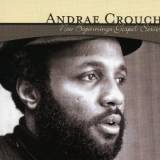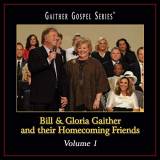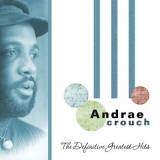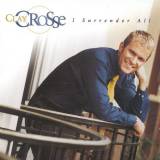
Andrae Crouch

Andrae Crouch
Popular
About
In an era when religious music in contemporary styles seems a significant and permanent part of the musical landscape, it is important to remember that at one time gospel music, especially, was almost exclusively rooted in long traditions. One person above all others expanded the gospel vocabulary to include elements of R&B and modern popular styles. Contemporary gospel's pioneer was Andraé Crouch, who over a thirty-year career has become one of the most influential musicians in the United States. Both the wide swath of black gospel performers who draw on R&B and the legions of white contemporary Christian artists who blur the line between sacred and secular with middle-of-the-road romantic styles owe Crouch a musical debt.
Crouch was born in Los Angeles on July 1, 1942. His twin sister Sandra and older brother Benjamin were both musical, and he is also the cousin of noted jazz critic Stanley Crouch. The three Crouch children sang in a trio at the behest of their father, who had begun to preach in order to strengthen his prayers to God that his son might be given musical talent. One Sunday, when Andraé was 11, his father preached at a church in Val Verde, California, and then called Andraé to the piano to accompany the church's choir in the hymn "What a Friend We Have in Jesus." Although Andraé, according to his own recollections, had never played the piano before, he performed successfully.
Music helped Crouch overcome shyness and a stammering impediment. "I started singing what I had to say," he recalled to People. "People became music to me because everything they said was a song." Indeed, Crouch began composing songs at age 14 and has never really slowed down; he still composes each morning during the prayers for which he rises at 6 a.m. Crouch moved with his family to the San Fernando Valley suburb of Pacoima when he was in junior high school, and his musical talents burgeoned.
In high school Crouch formed a group called the COGICS (an acronym for Church of God in Christ Singers) which also included vocalist Billy Preston of "Will It Go Round in Circles?" fame. Crouch attended Valley Junior College and Life Bible College in the Los Angeles area and counseled recovering drug addicts, but his heart was in music. By the mid-1960s he had put together another group, the Disciples, and the first of six Andraé Crouch and the Disciples albums, Take the Message Everywhere, was released in 1971 on the Light label.
Crouch's solo career began with the LP Just Andraé; in 1972, and throughout the 1970s his reputation rose steadily. Crouch and the Disciples toured worldwide, and in 1975 and 1979 they performed to sellout crowds at New York's Carnegie Hall. Already they were pushing the boundaries of gospel by introducing features of contemporary R&B styles, and gaining new fans from far outside the usual gospel sphere. Crouch's crossover gospel encompassed several aspects of secular music, including pop-style vocal arrangements, production techniques, and, most important, Crouch's crooned vocals themselves, miles removed from the intense fervor of traditional gospel.
The Disciples stormed another citadel of secular culture with an appearance on the NBC television Saturday Night Live comedy show in 1980; Crouch was later invited back for a solo performance. Crouch and the Disciples took home Grammy awards every year from 1978 through 1981, and Crouch's presence on the annual Dove Christian music awards roster was practically guaranteed for several years. However, Crouch did not let stardom interfere with his songwriting activities, and several of his 1970s compositions, including "Through It All" and "Take Me Back," have entered the gospel tradition's standard repertory.
Took Over Father's Ministry
Crouch's life took a new direction after his mother, father, and older brother Benjamin all died within a short period between 1993 and 1994. Shortly before his death, Crouch's father had maintained that his son was destined for the ministry—an idea that Crouch had always strongly resisted. "But, he knew I was going to be [a minister] one day," Crouch recalled to Jet. "And before he died, he said, 'Andraé, I want you to be ready. Have three black suits ready at all times.'" Crouch took over his father's Christ Memorial Church of God in Christ in Pacoima after his father's death, although he had little training as a preacher. His brother helped Crouch with the transition before meeting his own end several months later.
Even then, Crouch was unsure of his mission. But, he told People magazine, he had an otherworldly experience that convinced him to step into the pulpit: a mysterious force threw him to the floor as he sat one day listening to a sermon, and he heard a voice telling him to take over the church. "You will tell me yes," Crouch remembered hearing. "I've put too much into you for you to say no. Not 'right on,' not 'uh-huh.' 'Yes!'" The next night, Crouch remembered, he slept through the night for the first time since his mother had died.
Soon, attendance at the church had doubled. Crouch released the Mercy CD in 1994, for which he won yet another Grammy Award. He continued to compose and to make appearances as a performer. But the church consumed the lion's share of his energies during this time.
Despite the controversies that shadowed his own progressive music in the 1970s, he has been critical of certain more recent trends including the incursion of rap styles into gospel music. His enormous place in history, however, is secure, and was illustrated by the release in 1996 of the album Tribute: The Songs of Andraé Crouch. Of the countless gospel artists for whom Crouch's influence was critical, the album featured a representative selection including the Winans, Take 6, and Michael W. Smith.
Crouch continued to record through the 1990s and into the 2000s, releasing Pray in 1997, quickly followed by Gift of Christmas in 1998, Hall of Fame in 1999, Legends of the Gospel in 2002, Kings of Gospel in 2003, and He's Everywhere in 2004.
Featured Albums
Featured in These Lists

PraiseCharts chord charts are transposable, editable, capo friendly and ready for both digital and print use. They match the recordings you know and love, and provide noted tempo and worship-friendly fret diagrams. After experiencing chord charts from PraiseCharts, you may never want to download another kind of chord chart again!

This is as up-to-date as it gets. If a new song hits the airwaves and it starts trending fast, chances are you will be able to spot it here. If an old song suddenly spikes because of a unique current event, you'll see that here as well. So get out a bag of popcorn and hit refresh every 10 minutes to watch the race. Listen on Spotify.

These expertly curated charts provide the perfect musical backdrop for your congregation to celebrate the joy and wonder of Christmas. With precise chord notations and easy-to-follow arrangements, your worship team can confidently lead the congregation in timeless carols and modern classics. Make this Christmas season a harmonious and memorable one with our top-notch chord charts. Find free corresponding stage charts available here.

Planning for Christmas-themed services is just 'round the corner and we want you to have the best Christmas songs and hymns in a variety of traditional, modern, and contemporary arrangements. With a variety of different resources to support your worship band, choir, or orchestra, these are some of the best worship songs for the Christmas season.

We take pride in the precision of our chord charts so that your musicians can sound like a unified band. We put the right chords over the right words, arranged in sections that follow the original recording, measure for measure. Plus, if you want to make any adjustments, you can edit them right inside the site. Your edits will be available by default any time you access the same song in the future! Musicians download our chord charts more than any other product because they are accurate, clear and editable. Here is a list of our top downloaded chord charts for your praise and worship band! Listen on Spotify.














